PORTRAIT OF THE MARXIST AS AN OLD TROUPER
by Michael G. Horowitz
[published in Playboy, September 1970, 174ff, 228, 231f]
Not since the days of F. Scott Fitzgerald had young intellectuals flocked
so fervently to the estate of F. Ambrose Clark. The gatekeeper can tell
you about the time the Prince of Wales supped with Ernest Hemingway, H.
L. Mencken and the indefatigable Tallulah Bankhead. But by the Thirties,
Long Island was too near the Wall Street corpse to be fashionable and,
if you didn�t jump off Hart Crane�s Brooklyn Bridge, you went out to Hollywood
to peel grapes with Mae West.
But now the Clark estate was once again the center of the action. Three
years ago, a liberal lawyer from the Kennedy clan, Harris Wofford, had
come to claim the place for the State University of New York. And with
the Old Westbury campus in smooth operation and barrister Wofford comfortably
installed in the Main House, it was only natural to invite the nation�s
hottest political philosopher to commiserate with the local literati.
A week before, Wofford had put writer Jay Neugeboren up for display and
attracted only a handful. But Herbert Marcuse spelled Theory and the New
Left -- and that was bait that no young man worth his ascot could afford
to pass up on a balmy April evening.
They came in droves. In a wire-wheeled Triumph came The Most Wanted High
School Radical this side of Levittown in a silk, solid-color shirt carefully
opened three buttons down, the better to seduce PTA housewives and keep
latent principals unusually gentle. Beside him, his microdressed Sweet
Sixteen rapping sensuously about Marcuse�s possible program. "I hope
he talks about Eros and Civilization," she sighed, while fondling
her beau�s curls. "It�s so Reichian!"
"Don�t be ridiculous!" Most Wanted retorted, pulling himself
away. "It�ll all center around One-Dimensional Man. Capitalism
is collapsing and all you can think about is your damned orgasm!"
Ach, women! Useless in a revolutionary situation! Why�d he bring her along,
anyhow?
Just behind him came a dented Volkswagen bearing the big boys from the
city -- the SDS politician, the Rat reporter, the Newsreel photographer.
The SDS politico, complete with angular granny glasses and stern mustache,
looked out the window phlegmatically, while his friend from the underground
press fumbled with a tape recorder.
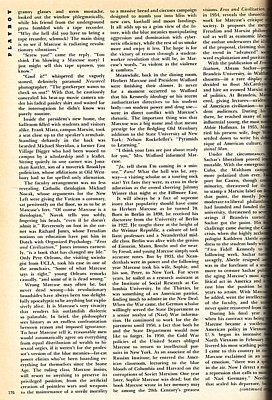 "Why
the hell did you have to bring a tape recorder, schmuck? The main thing
to see is if Marcuse is radiating revolutionary vibrations." "Why
the hell did you have to bring a tape recorder, schmuck? The main thing
to see is if Marcuse is radiating revolutionary vibrations."
"Screw you!" came the reply. "You think I�m blowing a
Marcuse story? I just might sell this tape uptown, you know."
"Cool it!" whispered the vaguely stoned, definitely paranoid
Newsreel photographer. "The gatekeeper wants to check us out!"
With that, he cautiously concealed his beat-up movie camera under his
faded paisley shirt and waited for the interrogation be didn�t know was
purely routine.
Inside the president�s new home, the ballroom filled with students, faculty,
and visitors. Frank Miata, campus Marxist, took a seat close up to the
speaker�s armchair. Standing defiantly in the back was bearded Michael
Sheridan, a former East Village Digger, who had been wooed to campus by
a scholarship and a leaflet. Sitting quietly in one corner was Jonathan
Kottler, son of a maverick Brooklyn politician, whose affiliation at Old
Westbury had so far spelled only alienation.
The faculty arrangement was no less revealing. Catholic theologian Michael
Novak, whose arguments for the New Left were giving the Vatican a coronary,
sat penitently on the floor, so as to be at Marcuse�s feet. "Of course
Marcuse is a theologian," Novak tells you softly, fingering his beads,
"even if he doesn�t admit it." Reverently on foot in the corner
was Richard Jones, whose Freudian notions on education have put him in
Dutch with Organized Psychology. "Eros and Civilization,"
Jones intones earnestly, "is a book that has changed my life."
Only Peter Orleans, the visiting sociologist from UCLA, took his ease
in one of the armchairs. "Some of what Marcuse says is right,"
young Orleans remarks casually, "and some of it is dead wrong."
Wrong Marcuse may often be, but never dead wrong -- his revolutionary
broadsides have always been too delightfully apocalyptic to be anything
but explosively alive. It is Marcuse�s very vivacity that renders his
outlandish dialectic so palatable. In brief, the philosopher sees history
as an endless confrontation between reason and imposed ignorance. To hear
Marcuse tell it, reasonable men would automatically agree on everything
from equal distribution of wealth to bisexual orgies, if it weren�t for
the professor�s version of the blue meanies -- fat-cat power elitists
who�ve been hoarding everything for themselves since the Stone Age. The
ruling class, Marcuse insists, will resort to anything to preserve its
privileged position, from the artificial creation of pointless wars and
weapons to the maintenance of a sterile morality to a massive bread-and-circuses
campaign designed to numb you into bliss with new cars, football, and
moon landings. It all adds up to a grim view of the future, with the blue
meanies manipulating aggression and domination with cybernetic efficiency,
while the rest of us smoke more and enjoy it less. The hope is for the
victory of reason through a student-worker revolution that will be, in
the words of Marcuse�s students, "just as violent as the violence
it combats."
Meanwhile, back in the dining room, Herbert Marcuse and President Wofford
were finishing their dinner. It never for a moment occurred to Wofford
that his Kennedy ideology or his recent authoritarian directives to his
student body -- on student power and drug use -- were in direct conflict
with Marcuse�s rhetoric. The important thing was that Marcuse was a big
name and that meant prestige for the fledgling Old Westbury addition to
the State University of New York: Nelson Rockefeller�s `Pyramids to Learning.�
"I think your fans are just about ready for you," Mrs. Wofford
informed Marcuse.
"Ja, tell them I�m coming in a minute." Fans! What the hell
was he, anyway -- a visiting scholar or a touring rock star? Yet fans
they were, as crass in their adoration as the crowd cheering Johnny Winter
that night at the Fillmore East.
It will always be a fact of supreme irony that
popularity should have come to Herbert Marcuse as he turned 70. Born in
1898 to a prosperous Jewish family in Berlin, he received a doctorate
in literature (magna cum laude) from the University of Freiburg in 1922.
He pursued a bookselling career in Berlin at the height of the Weimar
Republic, a culture of brilliant professors and a retro lower middle class.
Germany was alive with the genius of Brecht, Heidegger, Heisenberg, and
the nearby Freud, and young Marcuse simply took accurate notes. In 1933
he joined the Institute for Social Research in Frankfurt in its effort
to devise a social psychology critical of capitalist culture. But by then
the Retros were in power and the following year Marcuse -- a Jewish radical,
after all -- took his wife, Sophie, and his son, Peter, to New York. For
seven years, he served as research assistant at the transplanted ISR at
Columbia University. In the Thirties, he was something of an American
patriot, finding much to admire in the New Deal. When the War came, the
scholar willingly served the Office of War Information and the Office
of Secret Services as a senior analyst of German culture. He later headed
the State Department�s Central European Bureau, a fact that both he and
the State Department would now like to forget. In 1951, the Cold War policies
of the U.S. obliged Marcuse to return to academia. As an associate of
Russian institutes at Columbia and Harvard, he entered the American classroom,
lecturing to Ivy League blue-bloods on the corruption of Soviet Marxism.
Sophie Marcuse was dead, but the book Marcuse wrote in her memory may
be among the 20th Century�s greatest visions. Eros and Civilization,
published in 1955, reveals the theoretical groundwork for Marcuse�s critique
of modern society. It proposes the merger of Freudian and Marxist philosophy
-- erotic as well as economic liberation. But the author underscores the
idyllic nature of the proposal, claiming that, in reality, the trend in
"advanced" society is toward exploitation and repression.
Following its publication, Abram Sachar -- president of Brandeis University,
in Waltham, Mass. -- in a rare display of courage decided to flout national
opinion and hire an avowed Marxist as professor of politics and philosophy.
Accompanied by his second wife, Inge Werner, Marcuse settled in suburban
Boston to write his definitive critique of American culture, One-Dimensional
Man. On campus, meanwhile, the professor flowered, giving lectures
-- stridently critical of American civilization -- to packed student audiences.
During his tenure at Brandeis, he reached many of today�s most influential
young, the most notable being Angela Davis and Abbie Hoffman.
But President Sachar�s liberalism proved less than immutable. With the
emergence of Communist Cuba, the Waltham campus became more polarized
than ever. Faculty support for Castro, though confined to a minority,
threatened for the first time to stamp a Marxist label on Brandeis. At
that point, the mostly Jewish, mostly moderate-to-liberal philanthropists
who had funded the university since 1948, threatened to sever the purse
strings if Brandeis turned firebrand. Sachar got the point. His first
head-on challenge came during the Cuban missile crisis, when the acclaimed
anthropologist Kathleen Aberle closed an address to students with the
words, "Viva Fidel! Kennedy to hell!" Sachar reprimanded her
for "reckless" and "irresponsible" remarks, Aberle
resigned, and Marcuse was in the forefront of a campus move to reproach
the president for stifling academic freedom. (For its part, the American
Association of University Professors declined to censure the university.)
It was the aging Marcuse�s most significant political act in America and
it cost him the tenured position he had waited years to attain. With Marcuse,
it might be added, went the intellectual frontline of the faculty, and
the university has never quite recovered from the exodus.
During his final year at Brandeis, as his contract was being terminated,
Marcuse became a vociferous critic of American policy in Vietnam. After
the U.S. began its intensive bombing of North Vietnam in February 1965,
he delivered his most scathing polemic: "When I came to this country
in the Thirties," he exclaimed in an unusual show of emotion, "there
was a spirit of hope in the air. Now I detect a militarism and a repression
that calls to mind the terror of Nazi Germany." Needless to say,
that sealed his departure, but he wasn�t allowed to leave without a standing
student ovation, a yearbook dedication, and a gala student reception.
[back to top]
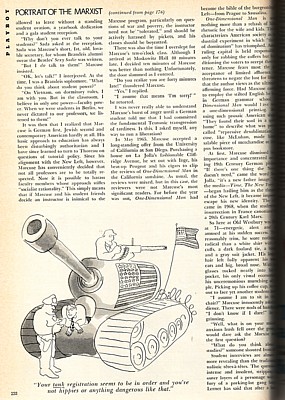 "Why
don�t you ever talk to your students?" Sada asked at the reception.
Sada was Marcuse�s short, fat, lovable old secretary, for whom Brandeis
alumni swear the Beatles� Sexy Sadie was written. "Why
don�t you ever talk to your students?" Sada asked at the reception.
Sada was Marcuse�s short, fat, lovable old secretary, for whom Brandeis
alumni swear the Beatles� Sexy Sadie was written.
"But I do talk to them!" Marcuse insisted.
"Okay, let�s talk!" I interjected. At
the time, I was a Brandeis sophomore. "What do you think about student
power?"
"On Vietnam, on dormitory rules, I am with you. But in the classroom,
I believe in only one power -- faculty power. When we were students in
Berlin, we never dictated to our professors, we listened to them."
It was then I realized that Marcuse is German first, Jewish second and
contemporary American hardly at all. His basic approach to education has
always been disturbingly authoritarian and I have since learned to turn
to Rousseau on questions of pedagogy. Since his alignment with the New
Left, however, Marcuse has conveniently decided that not all professors
are to be totally respected. Now it is possible to harass faculty members
whose approach crimps "socialist rationality."
There was also the time I overslept for Marcuse�s ten-o�clock class.
Although I arrived at Moskowitz Hall forty minutes late, I decided ten
minutes of Marcuse was better than nothing. Unfortunately, the door slammed
as I entered.
"Do you realize you are forty minutes late?" thundered Marcuse.
"Yes," I replied.
"I assume that means 'I�m sorry!'" he retorted.
I was never really able to understand Marcuse�s burst of anger until
a German student told me I had committed the fundamental Teutonic transgression
of tardiness. Is this, I asked myself, any way to run a liberation?
In May 1965, Marcuse accepted a long-standing offer from the University
of California at San Diego. Purchasing a house on La Jolla�s fashionable
Cliffridge Avenue, he set out with Inge, his beat-up Peugeot and his cigars
to clip the reviews of One-Dimensional Man in the California sunshine.
As usual, the reviews were mixed, but in this case the reviewers were
not Marcuse�s most significant readers. For before the year was out, One-Dimensional
Man had become the bible of the burgeoning New Left -- from Prague
to Sausalito.
One-Dimensional Man is actually nothing
more than a rehash of Marcuse rhetoric for the laity. The book characterizes
American society as an industrial experiment in which "the logic
of domination" has triumphed. American ruling capital is held responsible
not only for robbing the coffers but for conditioning the voters to accept
their impotence. Marcuse fears most the passive acceptance of limited
affluence, which threatens to negate the lust for liberation that the
author views as the ultimate life-affirming force. Had Marcuse continued
to employ the stilted English he learned in German grammar school, One-Dimensional
Man would have received a one-dimensional printing. But by using such
prosaic American slogans as "They found their soul in a split-level
home" to describe what was previously called "repressive desublimation,"
Marcuse, like McLuhan, made himself a salable piece of merchandise at
the campus bookstore. [back to top]
At first, Marcuse dismissed his new importance and concentrated on teaching
19th Century German philosophy. "If there�s one thing the New Left
doesn�t need," came the word from La Jolla, "it�s a new father
image." But as the media -- Time, The New York Times -- began hailing
him as the theoretician of the New Left, it became impossible to escape
his new identity. The clincher came in 1968, when the student-worker insurrection
in France canonized him as a 20th Century Karl Marx.
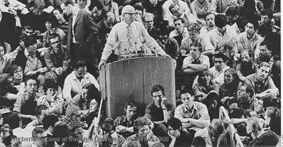 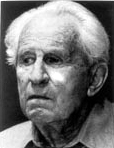 So
here at Old Westbury was Marcuse at 70 -- energetic, alert and calmly
amused at his sudden success. Tall and reasonably trim, he wore nothing
more radical than a white shirt with French cuffs, a dark foulard tie,
a black vest and a gray suit jacket. His long white hair left fully apparent
his enormous ears and broad nose. With reading glasses tucked neatly into
his breast pocket, his only visual eccentricity was his unceremonious
munching of an apple. Picking up his coffee cup, he walked out to face
yet another student interview. So
here at Old Westbury was Marcuse at 70 -- energetic, alert and calmly
amused at his sudden success. Tall and reasonably trim, he wore nothing
more radical than a white shirt with French cuffs, a dark foulard tie,
a black vest and a gray suit jacket. His long white hair left fully apparent
his enormous ears and broad nose. With reading glasses tucked neatly into
his breast pocket, his only visual eccentricity was his unceremonious
munching of an apple. Picking up his coffee cup, he walked out to face
yet another student interview.
"I assume I am to sit in this armchair?"
Marcuse innocently asked his audience. There were nods of bashful assent.
"I don�t know if I dare!" he added, grinning.
"Well, what is on your minds?" An anxious hush fell over the
group. Who would dare ask the Marxist mahatma the first question?
"What do you think about black studies?" someone shouted from
the back. Student interviews are almost always more revealing than journalistic
tête-à-têtes. The questions come intense and insolent,
stripping off outer layers of a personage with all the fury of a brush
massage. Max Lerner used to say that after a bout with students, a man
emerges either a saint or a hypocrite.
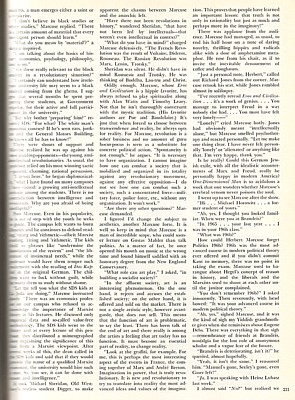 "I
don�t believe in black studies or white studies," Marcuse replied.
"There is a certain amount of material that every intelligent person
should learn." "I
don�t believe in black studies or white studies," Marcuse replied.
"There is a certain amount of material that every intelligent person
should learn."
"What do you mean by �material�?" a skeptic inquired.
"I am talking about the basics of history, economics, psychology,
philosophy, and so on."
"Are these really relevant to the black student in a revolutionary
situation?"
"I certainly can understand how irrelevant university life may seem
to black students coming from the ghetto. I suggest that several months
be spent preparing these students, at government expense, for their active
and full participation in the university."
"But why bother �preparing� them?" retorted SDS. "For
what? The white man�s economic courses? If he�s seen rats, junkies and
the General Motors Building, he knows all he has to know!"
There were shouts of support and Marcuse realized he was up against his
most puzzling opponents -- the young, anti-intellectual revolutionaries.
As usual, the professor relied on his most winning tactic -- patient,
charming, rational persuasion.
"I detect here," he began diplomatically, "what I have
found on many campuses I have visited: a growing anti-intellectual attitude
among the students. There is no contradiction between intelligence and
revolution. Why are you afraid of being intelligent?"
Poor Marcuse. Even in his popularity, he is out
of step with the youth he seeks to guide. The campus left wants to burn
libraries and he continues to defend reading, �riting and �rithmetic --
albeit Marxist reading, �riting and �rithmetic. The kids thrill to phrases
like "undermine the foundations of the system" and "the
liberation of instinctual needs," while the professor would have
them temper such excitement with the reading of Das Kapital in
the original German. The children want to fuck without guilt, while he
wants them to study without shame. [back to
top]
"Let me tell you what SDS at La Jolla is doing," Marcuse instructed.
"There was an economics professor on our campus who refused to accept
the importance of Marxist theory in his lectures. He discussed only empirical
data and so-called value-free methodology. The students went to the library
and at every lecture of this professor, they distributed a mimeographed
sheet explaining the significance of this data from a Marxist viewpoint.
After weeks of this, the dean called in the students and said that if
they would provide the name of a qualified Marxist economist, the university
would hire such a person. You see, it can be done with intelligence."
It took Michael Sheridan, Old Westbury�s restless student Digger, to
make apparent the chasm between Marcuse and the anarchic left. "Have
there not been revolutions in history," wondered Sheridan, "that
have not been framed by intellectuals -- that weren�t even intellectual
in context?"
"What do you have in mind?" charged Marcuse defensively. "The
French Revolution was inspired by Voltaire, Diderot, Rousseau. The Russian
Revolution by Marx, Lenin, Trotsky."
Sheridan was silent. He didn�t have in mind Rousseau and Trotsky. He
was thinking of Buddha, Lao-tzu, Mohammed, and Christ. Oddly enough, Marcuse,
whose Eros and Civilization is a hippie favorite, has always refused
to play spiritualist along with Alan Watts and Timothy Leary. Not that
he isn�t thoroughly conversant with the mystic tradition. (His favorite
authors are Poe and Baudelaire.) It�s just that when forced to choose
between transcendence and reality, he always opts for reality. For Marcuse,
revolution is a sober business and no amount of guru hocus-pocus is seen
as a substitute for concrete political action. "Spontaneity is not
enough," he warned L�Express the previous summer. "It
is necessary to have organization � I cannot imagine how one can combat
a society that is mobilized and organized in its totality against any
revolutionary movement, against any effective opposition -- I do not see
how one can combat such a society, such a concentrated force -- military
force, police force, etc. -- without any organization. It won�t work."
"Are there any other questions?" Marcuse demanded. The room
was quiet. The scholar rose from his chair, as if to invite the inevitable
denouement of coffee and doughnuts.
"Just a personal note, Herbert," called out Richard Jones from
the corner. Marcuse retook his seat, while Jones rambled almost in soliloquy.
"I�ve recently reread Eros and Civilization � it�s a work
of genius. You manage to interpret Freud in a way nobody else had � You
must have felt very lonely --"
"Lonely?" cried Marcuse hotly. Jones had obviously meant "intellectually
alone," but Marcuse smelled psychotherapy and reacted personally.
"Let me make one thing clear. I have never felt personally �lonely�
or �alienated� or anything like that. I�m very happy, thank you."
Is he really? Could this German Jewish exile, with his Marxist and Freudian
vision, really be personally happy in modern America? One-Dimensional
Man is so acidulous a work that one wonders whether Marcuse�s cerebral
venom never poisons the soul.
I went up to see Marcuse after the show. "Hi
... Michael Horowitz � a former student of yours."
"Ah, yes, I thought you looked familiar. When were you at Brandeis?"
"In 1965 ... your last year � I was in your 196b class."
"What was 196b?" How could Herbert Marcuse forget Politics
196b? 196b was the most advanced course in modern political theory ever
offered and if you didn�t commit Kant to memory, there was no point in
taking the exam. Marcuse used to harangue about Hegel�s concept of reason
in history, and the liberals and the Marxists used to shout at each other
until the janitor complained.
"You don�t remember 196b?" I asked innocently. Then reverently,
with head bowed: "It was your advanced course in modern political
theory."
"Ah, yes," sighed Marcuse, and it was the kind of sigh my Yiddish
grandmother gives when she reminisces about Eugene Debs. There was everything
in that sigh -- remembrance of friends past, nostalgia for the lost role
of anonymous scholar, and a vague fear of the future.
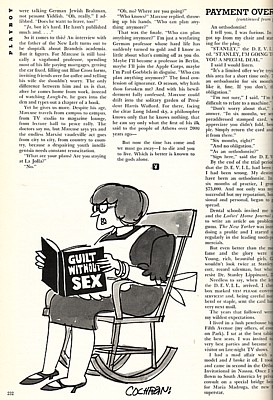 "Brandeis
is deteriorating, isn�t it?" he queried, almost hopefully. "Brandeis
is deteriorating, isn�t it?" he queried, almost hopefully.
"Yeah, it isn�t the same," I reassured him. "Manuel�s
gone, Seeley�s gone, even Coser left."
"Ja, I was speaking with Heinz Lubasz last week." I almost
asked "Nu?" but realized we were talking German Jewish Brahman,
not peasant Yiddish. "Oh, really?" I ad-libbed. "Does he
want to leave, too?"
"Ja, but it�s hard. He hasn�t published much and �"
So it comes to this? An interview with the father of the New Left turns
out to be shoptalk about Brandeis academia. [back
to top]
But it figures. For Marcuse is still basically a vagabond professor,
spending most of his life paying mortgages, getting the car fixed, filling
out Blue Cross forms, inviting friends over for coffee, and telling his
wife she shouldn�t worry. The only difference between him and us is that,
after he comes home from work, instead of watching Laugh-In, he goes into
the den and types out a chapter of a book.
Yet he gives us more. Despite his age, Marcuse travels from campus to
campus, from TV studio to magazine lounge, from lecture hall to peace
rally. The doctors say no but Marcuse says yes and the endless Marxist
vaudeville act goes from city to city, from country to country, because
a despairing youth intelligentsia needs constant resuscitation.
"What are your plans? Are you staying at La Jolla?"
"No."
"Oh, no? Where are you going?"
"Who knows?" Marcuse replied, throwing up his hands. "Who
can plan anything anymore?"
That was the finale. "Who can plan anything anymore?" I�m just
a wayfaring German professor whose hard life has turned to gold and I
know as little about what�s coming off as you do. Maybe I�ll become a
professor in Berlin, maybe I�ll join the Apple Corps, maybe I�m Paul Goebbels
in disguise. "Who can plan anything anymore?" The final confession
of ignorance. O Reason, why hath thou forsaken me? And with his bewilderment
fully confessed, Marcuse could drift into the solitary garden of President
Harris Wofford. For there, facing the clear Long Island sky, a philosopher
knows only that he knows nothing, that he can say only what the first
of his ilk whispered to his students in Athens over 2300 years ago:
But now the time has come and we must go away -- I
to die and you to live.
Which is better is known to the gods alone.
|
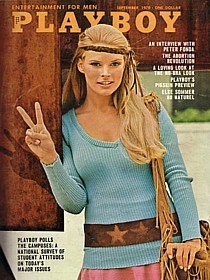

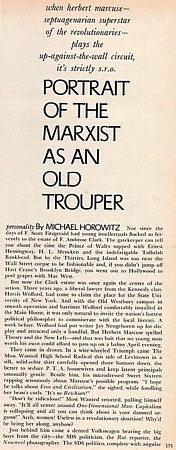



 So
here at Old Westbury was Marcuse at 70 -- energetic, alert and calmly
amused at his sudden success. Tall and reasonably trim, he wore nothing
more radical than a white shirt with French cuffs, a dark foulard tie,
a black vest and a gray suit jacket. His long white hair left fully apparent
his enormous ears and broad nose. With reading glasses tucked neatly into
his breast pocket, his only visual eccentricity was his unceremonious
munching of an apple. Picking up his coffee cup, he walked out to face
yet another student interview.
So
here at Old Westbury was Marcuse at 70 -- energetic, alert and calmly
amused at his sudden success. Tall and reasonably trim, he wore nothing
more radical than a white shirt with French cuffs, a dark foulard tie,
a black vest and a gray suit jacket. His long white hair left fully apparent
his enormous ears and broad nose. With reading glasses tucked neatly into
his breast pocket, his only visual eccentricity was his unceremonious
munching of an apple. Picking up his coffee cup, he walked out to face
yet another student interview.
